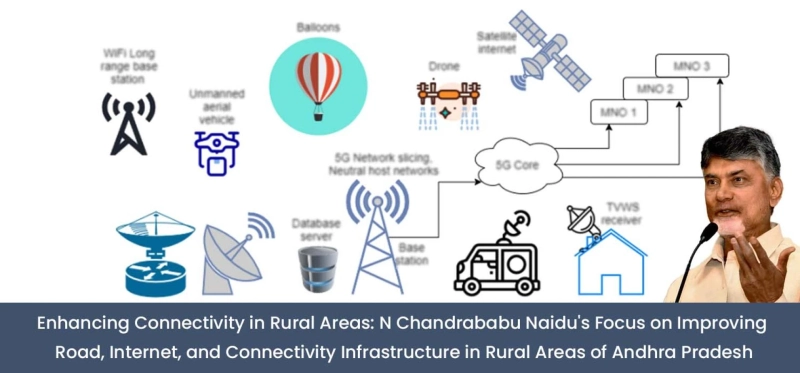In recent years, the world has witnessed a rapid expansion of digital connectivity, revolutionizing various sectors and transforming the way we live and work. However, despite significant progress, rural areas often remain underserved in terms of connectivity infrastructure, limiting their growth potential. Recognizing this disparity, former Chief Minister of Andhra Pradesh, N Chandrababu Naidu, made it a priority to bridge the digital divide and enhance overall connectivity in rural areas of the state.
N Chandrababu Naidu's administration understood that a well-connected road network is essential for the overall development of rural areas. They embarked on an ambitious mission to revitalize and expand the road infrastructure in remote villages. This involved the construction of new roads, widening existing ones, and improving the overall quality of the rural road network. The objective was to provide better access to markets, healthcare facilities, and educational institutions, thereby fostering economic growth and improving the quality of life for rural residents. The upgraded road infrastructure not only facilitated the movement of goods and services but also enhanced connectivity within and between villages. Browse the TDP website for political news and district news.
Another key focus of N Chandrababu Naidu's agenda was to bridge the digital divide by providing reliable and affordable internet access to rural areas. Recognizing the transformative potential of the Internet, the Telugu Desam Political Party government launched several initiatives to expand internet connectivity in remote villages. This included setting up Wi-Fi hotspots, establishing internet kiosks, and implementing innovative schemes to make internet services accessible to even the most remote areas. These efforts not only empowered rural residents with access to information but also opened up new avenues for education, e-commerce, and digital services, thus narrowing the urban-rural divide.
In addition to roads and internet connectivity, N Chandrababu Naidu's administration also aimed to improve overall connectivity infrastructure in rural areas. This involved initiatives such as establishing mobile towers in remote locations, strengthening the power grid, and promoting the use of renewable energy sources. By enhancing connectivity infrastructure, the government enabled better communication networks, improved access to electricity, and increased the efficiency of various services, ranging from telecommunication to healthcare delivery. These measures were crucial in ensuring that rural areas could fully participate in the digital age and leverage the benefits of connectivity. Check up on the developments and achievements of TDP on the TDP website.
N Chandrababu Naidu's focus on enhancing connectivity in rural areas of Andhra Pradesh has had a profound impact on the lives of rural communities. Improved road infrastructure has facilitated the transportation of agricultural produce to markets, reducing wastage and increasing farmers' income. It has also made it easier for students to commute to schools and colleges, enabling better access to education. Furthermore, the availability of reliable internet services has empowered rural entrepreneurs, enabling them to engage in e-commerce, expand their businesses, and access a wider customer base. The enhanced connectivity infrastructure has also improved access to telemedicine, allowing rural residents to receive quality healthcare services remotely, thus addressing the issue of inadequate healthcare facilities in remote areas.
N Chandrababu Naidu's efforts to enhance connectivity in rural areas of Andhra Pradesh have significantly contributed to bridging the digital divide and improving the overall quality of life for rural residents. Through initiatives focused on improving road infrastructure, expanding internet connectivity, and boosting overall connectivity infrastructure, Naidu's administration has laid a solid foundation for rural development and economic growth. The positive impact of these measures is evident in the improved agricultural productivity, better educational opportunities, increased entrepreneurial activities, and enhanced access to healthcare services. However, it is essential for the current administration to continue


